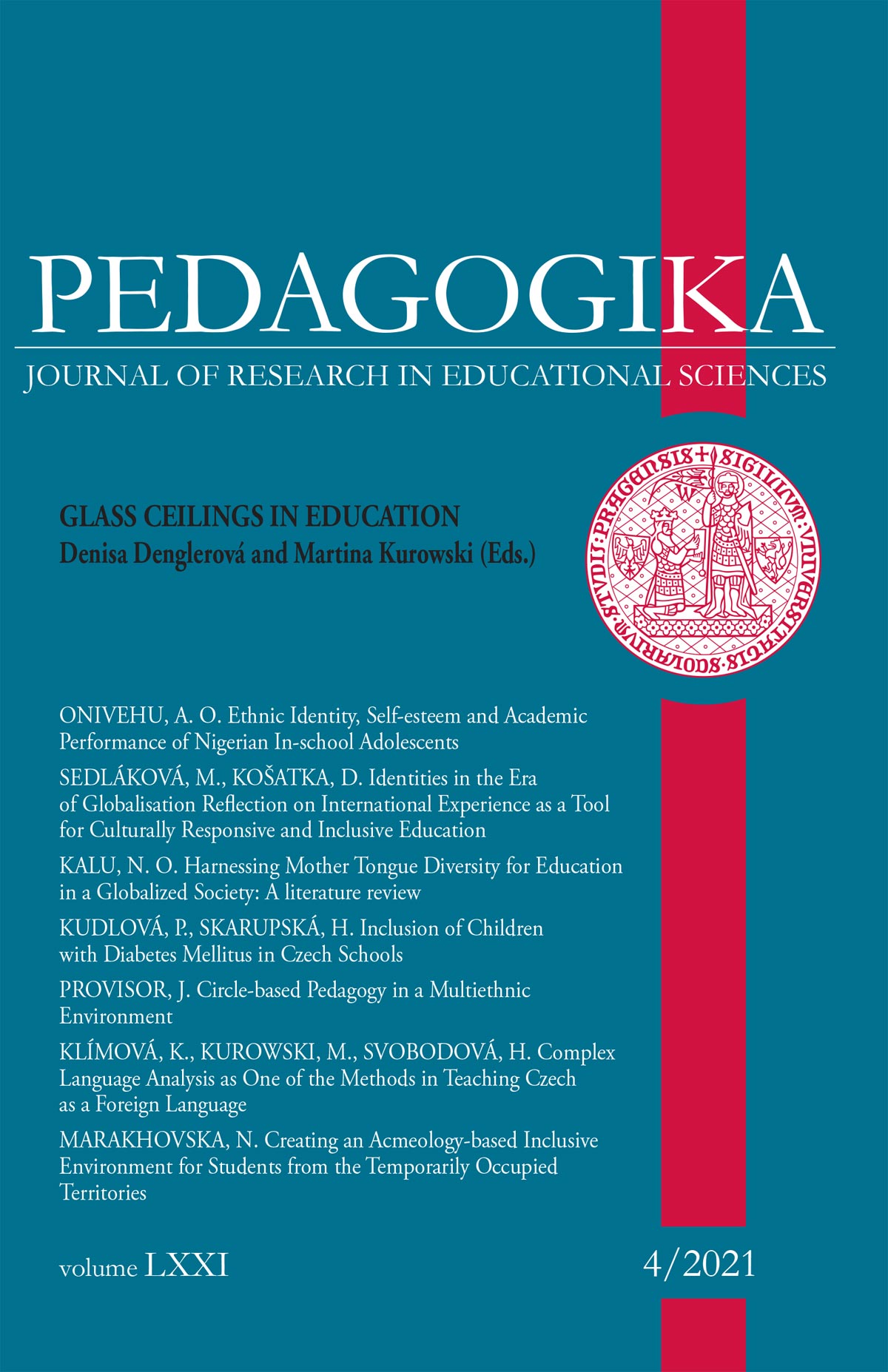Etnická identita, sebeúcta a akademický výkon nigerijských studujících adolescentů
DOI:
https://doi.org/10.14712/23362189.2021.1982Klíčová slova:
etnická identita, sebeúcta, školní výkon, studující adolescentAbstrakt
Rozvoj etnické identifikace hraje nedílnou roli při utváření sebe sama u školní mládeže,
zejména v Nigérii, která je do značné míry multikulturním a multietnickým národem. Tato
studie zkoumá, do jaké míry etnická identita a sebeúcta mohou předpovídat akademický výkon
u nigerijských studentů vyšších středních škol.
Metody: Studie se zúčastnilo celkem 735 nigerijských adolescentů studujících na veřejných
a soukromých vyšších středních školách v Ilorinu v oblasti Kwara v Nigérii. Nezávislé proměnné
(etnická identita a sebeúcta) byly měřeny škálou multietnické identity (MEIM) a Rosenbergovou
škálou sebeúcty (RSE). Data byla statisticky vyhodnocena (analýza četnosti, procentuální analýza,
korelační analýza a vícenásobné regresivní analýza).
Výsledky této studie ukázaly, že většina respondentů měla vysokou úroveň etnické identity
a sebeúcty. Etnická identita a sebeúcta se navíc ukázaly jako významný prediktor akademického
výkonu.
Doporučení: Doporučuje se rozvíjet a podporovat etnickou sebeidentitu i skupinovou identitu
nigerijských studentů prostřednictvím různých psychosociálních intervencí.
Reference
Abubakar, H. S. (2018). Relationship among self-esteem, attitude to school and students' academic performance among federal government colleges in North-West Zone of Nigeria. Journal of Education and Practice, 9(36), 13- 20.
Adelabu, D. H. (2008). Future time perspective, hope, and ethnic identity among African American adolescents. Urban Education, 43, 347-360.
https://doi.org/10.1177/0042085907311806
Anene, J. N., Ikerionwu, J. C., & Danladi, E. N. (2013). Student-teachers knowledge and acquisition of computer in sandwich programme of University of Abuja, Nigeria. International Journal for Cross-Disciplinary Subjects in Education, 4(4), 1332-1340.
https://doi.org/10.20533/ijcdse.2042.6364.2013.0186
Ashmore, R. D., Deaux, K., & McLaughlin-Volpe, T. (2004). An organizing framework for collective identity: Articulation and significance of multidimensionality. Psychological Bulletin, 130, 80-114.
https://doi.org/10.1037/0033-2909.130.1.80
PMid:14717651
Bassey, A. O., Omono, C. E., Bisong, P. O., & Bassey, U. A. (2013). States and local government areas creation as a strategy of national integration or disintegration in Nigeria. Journal of Educational and Social Research, 3(1), 237-245.
Bracey, J. R., Bámaca, M. Y., & Umana-Taylor, A. J. (2004). Examining ethnic identity and self-esteem among biracial and monoracial adolescents. Journal of Youth and Adolescence, 33(2), 123-132.
https://doi.org/10.1023/B:JOYO.0000013424.93635.68
Byrd, C. M., & Chavous, T. M. (2009). Racial identity and academic achievement in the neighborhood context: A multilevel analysis. Journal of Youth and Adolescence, 38, 544-559.
https://doi.org/10.1007/s10964-008-9381-9
PMid:19636727
Cokley, K., McClain, S., Jones, M., & Johnson, S. (2012). A preliminary investigation of academic disidentification, racial identity, and academic achievement among African American adolescents. The High School Journal, 95, 54-68.
https://doi.org/10.1353/hsj.2012.0003
Danmole, H. O. (2012). Religion, politics and the economy in nineteenth century Ilorin: some reflections. Ilorin: Unilorin Press.
DeLaney, E. N. (2018). Ethnic-Racial Identity and academic achievement: examining mental health and racial discrimination as moderators among Black college students. Unpublished thesis, Virginia Commonwealth University.
Hudley, C., & Irving, M. (2012). Ethnic and racial identity in childhood and adolescence. APA Educational Psychology Handbook, 2, 267-292.
https://doi.org/10.1037/13274-011
Hughes, M., Kiecolt, K. J., Keith, V. M., & Demo, D. H. (2015). Racial identity and well-being among African Americans. Social Psychology Quarterly, 78(1), 25-48.
https://doi.org/10.1177/0190272514554043
Ishola, A. A., & Udofia, I. G. R. (2017). Effect of demographic factors and teachers' mastery of instructional designs as predictors of pupils' achievement in mathematics. Journal of Educational Research and Development, 15(1), 10-24.
Juhong, B., & Maloney, T. (2006). Ethnicity and academic success at university. New Zealand Economic Papers, 40(2), 181-213.
https://doi.org/10.1080/00779954.2006.9558560
Muhammad, A., Syed, M. I. H. Z., & Khalid, M. (2015). Self-esteem and academic performance among university students. Journal of Education and Practice, 6(1), 156-162.
Onivehu, A. O. (2020). The relationship between psychological capital and academic performance of social work students. Socialni pedagogika/Social Education, 8(1), 53-67.
https://doi.org/10.7441/soced.2020.08.01.03
Onivehu, A. O., Adegunju, A. K., Ohawuiro, E. O., & Oyeniran, J. B. (2018). The relationship among information and communication technology utilization, self-regulated learning and academic performance of prospective teachers. Acta Didactica Napocensia. 11(1), 69-85.
https://doi.org/10.24193/adn.11.1.6
Rivas-Drake, D. et al. (2014). Ethnic and racial identity in adolescence: Implications for psychosocial, academic, and health outcomes. Child Development, 85(1), 40-57.
https://doi.org/10.1111/cdev.12200
PMid:24490891 PMCid:PMC6673646
Robins, R. W., Tracy, J. L., & Trzesniewski, K. H. (2008). Naturalizing the self. In O. P. John, R. W. Robins, & L. A. Pervin (Eds.), Handbook of personality: Theory and research (pp. 421-447). 3rd ed. New York, NY: Guilford Press.
https://doi.org/10.1080/03060497.2008.11084054
Rust, J. P., Jackson, M. A., Ponterotto, J. G., & Blumberg, F. C. (2011). Biculturalism and academic achievement of African American high school students. Journal of Multicultural Counseling and Development, 39, 130-140.
https://doi.org/10.1002/j.2161-1912.2011.tb00146.x
Schwartz, S. J., Zamboanga, B. L., Luyckx, K., Meca, A., & Ritchie, R. A. (2013). Identity in emerging adulthood reviewing the field and looking forward. Emerging Adulthood, 1(2), 96-113.
https://doi.org/10.1177/2167696813479781
Sheu, H., Mejia, A., Rigali-Oiler, M., Primé, D. R., & Chong, S. S. (2016). Social cognitive predictors of academic and life satisfaction: Measurement and structural equivalence across three racial/ethnic groups. Journal of Counseling Psychology, 63(4), 460-474.
https://doi.org/10.1037/cou0000158
PMid:27177025
Stock, M. L., Gibbons, F. X., Gerrard, M., Houlihan, A. E., Weng, C. Y., Lorenz, F. O., & Simons, R. L. (2013). Racial identification, racial composition, and substance use vulnerability among African American adolescents and young adults. Health Psychology, 32(3), 237-247.
https://doi.org/10.1037/a0030149
PMid:23088177 PMCid:PMC3749923
White, L. H., & Worrell, F. C. (2012). Intersections of race, identity, and academic achievement. Human Development, 55(2), 97-104.
https://doi.org/10.1159/000338536
Worrell, F. C. (2007). Ethnic identity, academic achievement, and global self-concept in four groups of academically talented adolescents. Gifted Child Quarterly, 51(1), 23-38.
https://doi.org/10.1177/0016986206296655
Worrell, F. C. (2014). Theories school psychologists should know: Culture and academic achievement. Psychology in the Schools, 51(4), 332-347.
https://doi.org/10.1002/pits.21756
Yeboah, A. K., & Smith, P. (2016). Relationships between minority students online learning experiences and academic performance. Online Learning, 20(4), 135.
https://doi.org/10.24059/olj.v20i4.577
Zajda, J., Biraimah, B., & Gaudelli, W. (Eds.). (2008). Education and social inequality in the global culture. Dordrecht: Springer.



